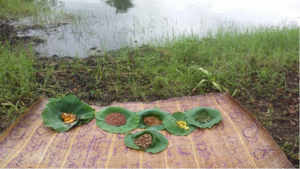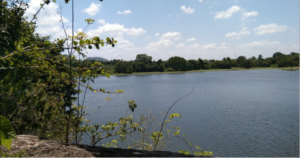The hydraulic civilization secures a prominent place in Sri Lankan heritage. The most important aspect of this is it appears as a combination of both natural and cultural heritage. The water tank is not just a single water storage apparatus but a point in a wider cascade system that consists of a series of large- and small-scale tanks and canals interconnected within a catchment of the dry zone. These ambitious projects were built to harness the monsoon rain and seasonal rain waters as a solution to variations in weather and climate.
The rulers of the ancient Sri Lanka were pivotal in the construction and maintenance of the vast system of water tanks. Likewise, there are thousands of small village tank cascade systems scatted across the country, built through the collective patronage of villages. These tanks constantly provide water for agriculture and daily communal activities—a central component of village life. These ‘village cultures’—developed in and around water—have become inextricably linked to their physical environments, a testament to the interdependence of man and nature. This bio-cultural environment is at the heart of village cultures and reflects a harmonious connection between culture and nature.
This research mainly focuses on the environmental folklore and traditional knowledge systems associated with these small cascade village communities as valuable cultural heritage asserts for climate change adaptation. Folk songs, folk stories and the cultural memory of village folks were collected as primary data. This data collection covers all the provinces of Sri Lanka. The main case studies were conducted in Galtemwewa, North central province, Dewanapethisgama, North Central Province and Kalukele, North Central Province in Sri Lanka. Galtemwewa, Kiriwanagoda wewa, Rankirimada wewa, Panandu wewa, Kadadeka wewa, Ihala wewa, Nabada wewa and Kalukele wewa are the small village tanks identified as the small village tanks of the respective areas. Protecting and the maintenance of these tanks were a collective responsibility of the villagers and water management of these tanks were determined by the customary laws.
This research mainly examines on the role of women in small-scale tank cascade village communities in Sri Lanka as a response to extreme weather events and climate change. The intangible heritage mainly the environmental folklore that related to women’s roles in these village cultures was examined as primary sources.
The multi-faceted contribution of women towards the livelihood, a range of gendered socio-economic roles including paddy cultivation, harvesting, protecting cultivated land, seed conservation, animal rearing, food gathering, water fetching and craft activities that fulfil their household utensils were identifies as valuable findings of the research. Women are identified as most affected by extreme weather events. However, this research showcases that these challenges face by women, gendered division of labour and gender tasks enrich and strengthen them with the knowledge of local ecology, traditional weather forecasting, and household management, proactive in water related conditions. This research offers an alternative profile of energetic and empowered women, providing an alternative picture beyond the domestic sphere demonstrates the strength, capacity, skills, and responsibility and futuristic approaches of women towards the well-being of the family, the society and environment. Role of women as a heritage bearer and her indigenous climate knowledge can effectively contribute towards climate solutions, climate change adaptation strategies and environmental decision making.




